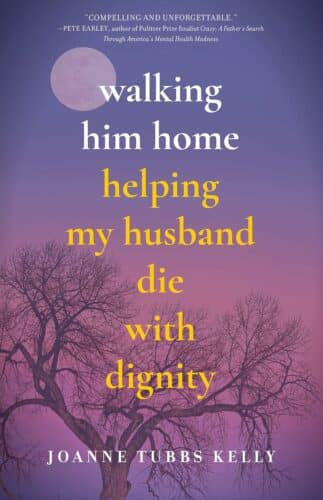 Walking Him Home: Helping My Husband Die With Dignity
Walking Him Home: Helping My Husband Die With Dignity
Author: Joanne Tubbs Kelly
Love, like illness, is often sudden and complicated. With four failed marriages behind them, Alan and Joanne hardly expected to find each other. Joanne was divorced, living on her own for the first time, in a new job. Alan, her boss, had recently been abandoned by his wife. It was the beginning of a deep, lasting affair of the heart. It was also the beginning of a painful journey that would end on January 11, 2020, with Alan sitting in bed, drinking a cocktail of medicines designed to end his life.
When Alan was sixty-nine, Joanne watched as he was finally diagnosed with Multiple System Atrophy (MSA). It was not a surprise, but merely a confirmation of a decade’s long, losing struggle to fight Alan’s mind, which was gradually shutting down. In the end, readers are told that Alan had cerebellar MSA. The only real way to be sure, because of the rarity of the disease and some of its shared properties with other neurological diseases such as Parkinsons, is an autopsy.
MSA is a rare neurodegenerative disease. It’s fatal. There is no cure. No treatment. No one knows what causes it. For Alan, MSA made it nearly impossible to speak. It eventually took away basic movement, motor control, and coordination. It meant that he needed constant catheterization, which lead to near-deadly infections and endless pain. But at first, it showed up as an unsettled sleep pattern – a mere quirk.
But before all this – Joanne’s new marriage started with the prelude of what was to come. Both her parents came to live with them as first her mother, then her father began to decline both physically and mentally. As Joanne made the hard decisions for each, including when and how to let go, and how to respectfully and appropriately treat an aging person with medical needs, we see how this will all snowball into the decision that looms on the horizon. Already, Alan is stirring in his sleep, making the weird thrashings that will grow violent and eventually lead them to separate beds one Valentine’s Day, starting a progression of sleep studies and finally leading to a neurologist.
Walking Him Home is a complicated narrative about love and choices. It’s an honest memoir, and despite the title, it’s not all about dying. It’s more about the dignity of living, making and respecting hard choices, and advocating for yourself and those you love in the face of callous (or just plain bad) doctors and nurses.

Image by Dmitriy Gutarev from Pixabay
But you really want me to talk about medical aid in dying, don’t you? That’s the triggering issue here, and Joanne handles the issue deftly. As the spouse, the woman who has finally found her love, she doesn’t want to let go. She doesn’t want Alan, who has no reservations or second thoughts about what he wants, to choose Colorado’s medical aid in dying option. Every fiber of her being is against it. Not from a moral or an ethical viewpoint, but from the desperately personal motivation of a loved one who does not want to let go.
Joanne does briefly talk about the difference between “assisted suicide” and “medical aid in dying.” In suicide, the person WANTS to die. In medical aid in dying, the person wants to live, but does not have a choice, and is therefore choosing to avoid pain (and maintain dignity) by determining how and when they die; the person receives a specific cocktail of medicines from a physician and then administers it to themselves (the self-administration is the key here). Note that euthanasia (which is illegal across the US) is when someone else, say a physician or loved one, administers the drug or otherwise facilitates the person’s death directly (as in a “mercy killing.”)
The specifics of the Colorado law (and the ability to qualify for it) include that you must have less than six months to live to qualify, that you must be of completely sound mind, and that you must be able to administer the fatal cocktail yourself.) Joanne spends a bit of time breaking this all down, but she spends less time with the big ethics and more time with her feelings about Alan, about wanting to hold on to him, and about how it feels to lose someone, piece by piece, to a disease. It’s about survival, dignity, and living, day by day, in the face of terminal illness.
By the end, Alan needs a team to help him, machines to move him. It’s exhausting. Unknown to them, covid is looming. Thankfully, they missed that disaster by a few months.
Walking Him Home is complicated and heartfelt, an honest, unabashed memoir that is both beautiful and poignant. It’s about a woman opening up, revealing her love and her pain, talking about the hard moments in life, the love and the letting go, the beauty that seeps in to broken places. It’s about the indecency of disease and the indomitable nature of the human spirit. It’s about the loss of dignity that comes with aging and the body’s many forms of betrayal. It’s about the inadequacies of the medical system, the exhaustion of both the caretakers and cared for, the pain and hurt, the love and exhaustion. Highly recommended.
– Frances Carden
Follow my reviews on Twitter at: https://twitter.com/xombie_mistress
Follow my reviews on Facebook at: https://www.facebook.com/FrancesReviews
- Book Vs Movie: The Shining - April 6, 2020
- Thankful For Great Cozy Mysteries - December 13, 2019
- Cozy Mysteries for a Perfect Fall - October 20, 2019

